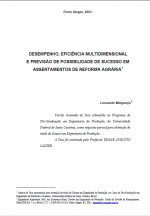documento
A decision support methodology for increasing public investment efficiency in Brazilian agrarian reform

Políticas Públicas
Autor(es): Leonardo Melgarejoa, Joa˜o Neiva de Figueiredob and Carlos Ernani Friesc
Abstract The Brazilian Agrarian Reform Program has subsidized the settlement of over 425,000 destitute families on previously unproductive land in what has become a very effective vehicle for social inclusion and productivity growth for those settlers who reach the final stage of the process and receive definitive title to the land. Unfortunately, there is a large difference in efficiency and productivity between more and less successful settlements – fewer than 10% of relocated families have received title and over 25% of them have abandoned the property to which they were assigned. This paper presents a decision support methodology for increasing the efficiency of public investments in agrarian reform that includes a data envelopment analysis model and a mechanism for building consensus among the various constituencies of the agrarian reform process, who not infrequently have conflicting objectives. The OR model described herein uses principal component analysis and data envelopment analysis to identify the most important success factors for relocated families leading to an increase in the chance of both autonomous integration with the market economy and definitive entitlement by these displaced families as well as an increase in the predictability of future settlement success. The model was implemented successfully in Rio Grande do Sul, the southernmost state of Brazil, and was partially used in a pilot project for the countrywide agrarian reform accelerated consolidation program. Keywords: agrarian reform; agriculture efficiency; DEA; decision support systems
Tipo: Artigo
Idioma: Inglês
Baixe aqui



